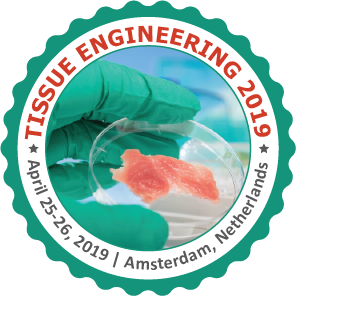Frédéric Eghiaian
JPK BioAFM Center, Germany
Title: Quantitative characterization of adhesion and cytomechnics of living cells on biomaterials and tissues
Biography
Biography: Frédéric Eghiaian
Abstract
Introduction: The versatility and refi nement of biomaterials and tissues engineered for regenerative medicine is growing, as is the need to characterize their properties and host interactions. The topography and mechanical properties of biomaterials are crucial parameters that infl uence cell adhesion/motility, morphology and mechanics as well as the fate of stem and progenitor cells [1, 2, 3]. Methods: Atomic force microscopy (AFM) is a powerful tool which allows the comprehensive study of all these properties and interactions with nanometer scale resolution under controlled environmental conditions. The inherent drawbacks of traditional AFM imaging modes for fast imaging or for challenging samples like living cells has been impressively overcome by the novel NanoWizard® ULTRA Speed AFM, which not only enables high-speed studies of time-resolved dynamics associated with cellular processes, it’s latest scanner technologies and compact design also allow full integration of AFM into advanced commercially available light microscopy techniques. Thus, fast AFM imaging of several frames per second can be seamlessly combined with methods such as epi-fl uorescence, confocal, TIRF, STED microscopy, and many more. Results: Using AFM, mechanical properties like the Young’s modulus of biomaterials, tissues or cells can be determined. Furthermore, the nanostructure of biomaterials like aligned collagen matrices and cell alignment on such structures have been resolved [3]. Using Single Cell Force Spectroscopy (SCFS), cell-substrate or cell-cell/tissue interactions can be measured down to single protein unbinding. The Nano-mechanical analysis of cells is increasingly gaining in importance in different fi elds in cell biology like cancer research and developmental biology. Discussion & Conclusions: We will present how the latest advances in the ULTRA Speed AFM are being applied to studyt a wide-range of biological specimen, from individual biomolecules to collagen type I fi brillogenesis to mammalian cells and tissues.

